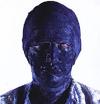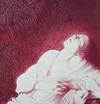"KINDSKOPF" catalogue – November 30, 1990
"Kindskopf", Niederösterreichisches Landesmuseum in der Minoritenkirche Krems/Stein, 1991
KINDSKOPF Foreword
At the same time that he painted pictures of injured and abused children, from 1969, around 1971/72 the bandaged child became the most important figure next to the artist himself and the martyr allied with him in his actions.
At the same time that he painted pictures of injured and abused children, from 1969, around 1971/72 the bandaged child became the most important figure next to the artist himself and the martyr allied with him in his actions.
The child is the embodiment of the innocent, defenceless, sacrificed individual at the mercy of brute force. As an innocent "child of light", whose head and hand injuries emit light rays like self-radiating stigmata, he is heroized into a sufferer and saviour figure, just as the artist is. In a photography sequence of 1972, this light mysticism is expressly transferred to the self-portrait of the artist as martyr. The scars and bandages of the face of the grimacing artist in the photographs are transformed by a grattage technique into radiant white trajectories.
As shown also by his many actions with children in public, the group portrait with children has become a permanent subject for Helnwein. His commitment to the rights of children has nothing to do with "infantomania", as manifested in a socially isolated "children's culture", in commercialized "Children's media", in the child as a pedagogical subject, and in the ideological transfiguration of one's own childhood.
Helnwein must also be set apart from Viennese Aktionism as he does not reduce the child's body to mere aesthetic material (as in the "Material Aktions" of Günter Brus, Hermann Nitsch, and Otto Muehl), but instead endows it with a symbolic function in representing defenceless, sacrificed man. The sexualistic concept of the child in (Freud-influenced) "Viennese Aktionism" is countered by the moralist and utopian Helnwein with the child as a sexless salvation figure. The tendency to a patriarchal transfiguration and idealization of an innocent, sacrificing child-man embracing children and artists as the sole creative interest group and excluding the female, which is assigned to the sphere of the other aesthetic objects, is the main feature distinguishing Helnwein's world of pictures from the pan-sexualism and libido anarchy of the Vienna Aktionsits group of old.
The idyllic group portrait of the artist as Man of Sorrows with maltreated children also has a biographical, and autobiographical aspect, since his own children Cyril, Mercedes, and Ali have advanced to the role of models for his live and photoactions.
HELNWEIN, "KINDSKOPF"
Niederösterreichisches Landesmuseum
In der Minoritenkirche Krems/Stein
26. May - 7. July 1991
http://www.gottfried-helnwein-child.com
http://kristallnacht.helnwein.com


